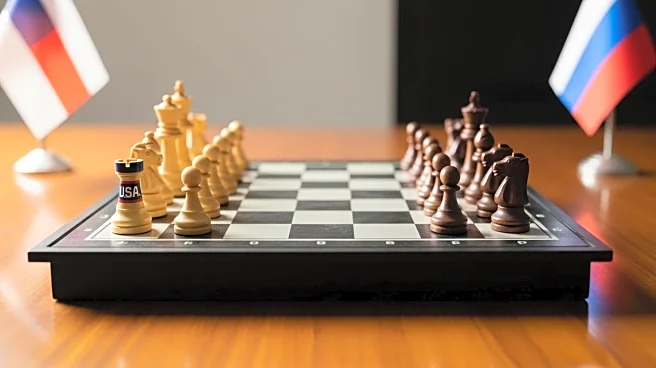What is the story about?
What's Happening?
President Trump has made a significant shift in his stance regarding the Ukraine war, following a meeting with Ukrainian President Volodymyr Zelenskyy. Trump, who previously suggested that Ukraine might need to cede territory to Russia, now believes Ukraine can reclaim all its land with the support of the European Union and NATO. This change comes after Trump expressed frustration with Russian President Vladimir Putin's actions, particularly the escalation of bombardments in Ukraine. Trump's comments at the United Nations General Assembly have sparked discussions among European leaders about the sincerity of his shift and its implications for future negotiations.
Why It's Important?
Trump's shift in stance on Ukraine could have substantial implications for international relations and the ongoing conflict. If the U.S. increases support for Ukraine, it may pressure Russia to reconsider its military strategies and potentially lead to negotiations. European allies, reassured by Trump's new position, might strengthen their support for Ukraine, impacting the geopolitical balance in the region. However, Trump's rhetoric at the U.N., which included criticisms of green energy policies and immigration, has unsettled some diplomats, highlighting the complexity of international diplomacy under his administration.
What's Next?
The next steps involve observing whether Trump's rhetorical shift translates into concrete policy changes. European leaders and NATO may need to assess their strategies in light of Trump's comments. Additionally, Russia's response to Trump's remarks, particularly the characterization of Russia as a 'paper tiger,' will be crucial in determining the future of the conflict. Diplomatic engagements, such as the meeting between Secretary of State Marco Rubio and Russian Foreign Minister Sergei Lavrov, will play a role in shaping the trajectory of U.S.-Russia relations.
Beyond the Headlines
Trump's shift on Ukraine reflects broader trends in his administration's foreign policy, characterized by fluctuating positions and strategic recalibrations. The implications extend beyond immediate geopolitical concerns, potentially affecting U.S. domestic politics and Trump's relationships with international allies. The rhetoric used by Trump at the U.N. also raises questions about the ethical dimensions of his leadership style and its impact on global diplomatic norms.

















